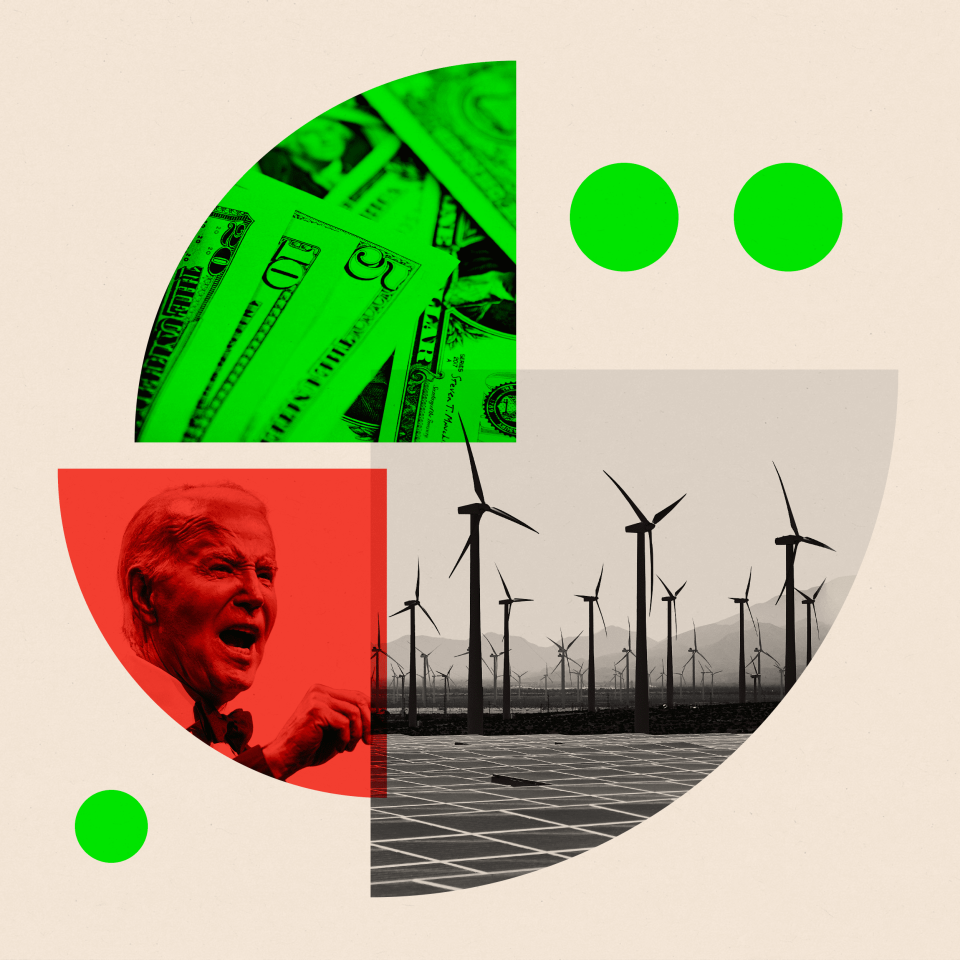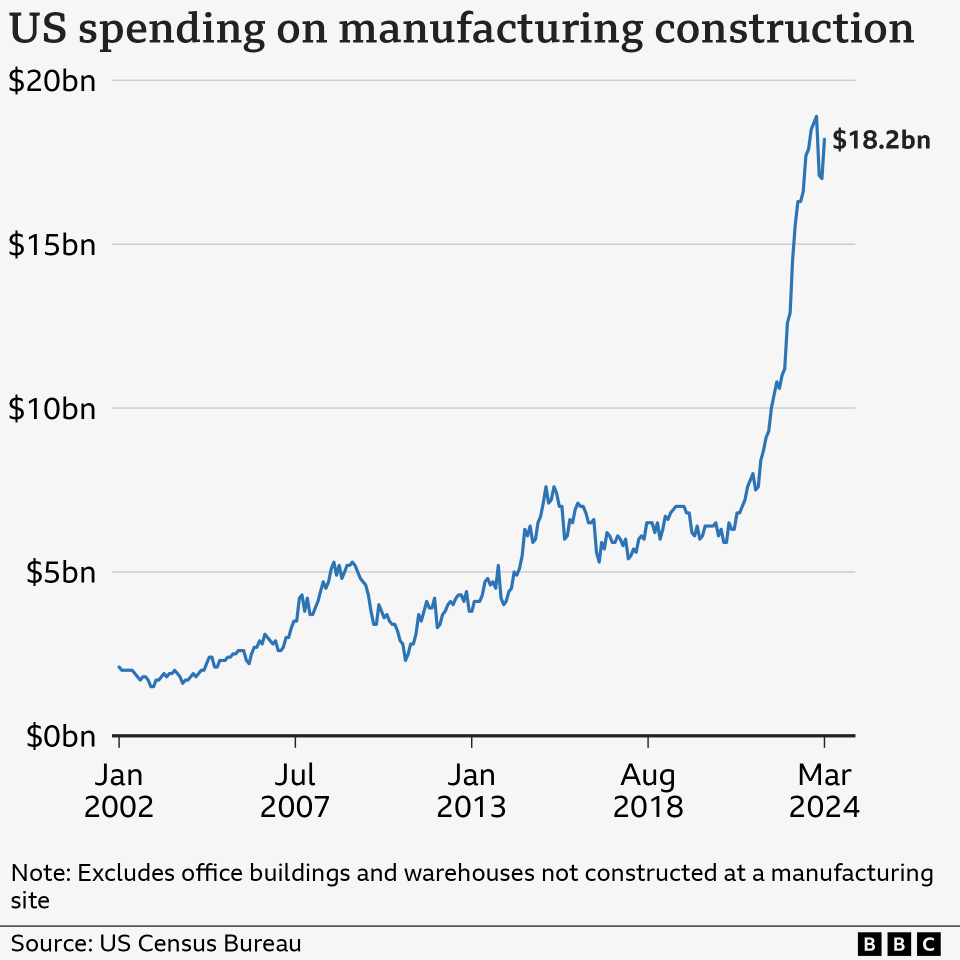Could the US economy be doing too well?

The US is enjoying a strange economic boom, with consequences for the global balance of power, the future of the planet and the UK's future growth prospects. It is borrowing billions to boost its economy - taking a huge risk but with potentially huge rewards.
The boom is visible on the ground. On a recent trip to Georgia in the south of the US, I saw fields and forests being turned into factories with extraordinary speed. In 20 years of reporting around the world, what I have seen in the US over the past year can only compare to what I saw in China in the mid-2000s.
US President Joe Biden's economic policies are changing the country’s landscape. The numbers show the scale: Since February 2021 - just after his inauguration - monthly investment in factory construction has more than trebled, to almost $20bn (£16bn).
The China comparison is not a coincidence. Mr Biden is spending huge amounts of money to bring the manufacturing of green industries and microchips back to the US from China.
Where the global green economic transition once looked like it was destined to be "made in China", now the US is now staking its claim. But it comes with risks.

The US is borrowing hundreds of billions of dollars to pay for it. There are concerns that this could push US inflation higher again just as price rises are beginning to slow. And there are fears the country is building up too much debt. The US annual deficit is around 6% of the size of the economy, well above the historical average of 3.7%.
There are positives. Unemployment in the US is at its lowest rate for 50 years and hundreds of thousands of new workers are joining the US workforce every month, defying all expectations. The US says it is on course to build a fifth of the world’s advanced microchips.
Wall Street titan Jamie Dimon, the boss of JP Morgan, said the "booming" US economy was "unbelievable", with the average consumer "much wealthier than before".
The state of Georgia is one of the big beneficiaries of this spending spree. It is part of the so-called Battery Belt, an area of land largely across the south east where factories for electric car batteries and related components are springing up.
Covington is best known as the small town where the Vampire Diaries was filmed, but it is now the site of a factory for Archer Aviation, which will be completed this year. It plans to mass-produce what it describes as flying cars, though the model I saw looked more like a giant drone-copter, with a dozen propellers and wheels.
Across town, the ground has been prepared for a factory for electric trucks. Once finished, it's expected to produce thousands of $100,000 trucks every year. On the Georgia coast, within a year a brand new Hyundai "meta factory" for electric cars and batteries will start production, with plans to produce half a million cars a year.
Yet at the local Scoops ice cream parlour, both locals and tourists say they don't feel they are living through a boom. Prices remain high. Families are depending on their credit cards. This is an industrial boom, taking place in factories and not something people have noticed in their everyday lives.
"It's not terrible," one customer told me. "I mean, we adjust to it, the cost of everything, and you just kind of move on. We're not going to stop living life as things are, but just work harder. That's our motto."
That prices are still rising by more than expected means interest rates are staying high. The cost of borrowing in the US is currently at its highest level for 22 years as the US central bank tries to slow inflation.
But in Georgia's capital, the Atlanta Federal Reserve president Raphael Bostic says many people are "less sensitive" to interest rate rises than they were. He says this is because of the trend in the US for long-term, 30-year mortgages - people's biggest loans are often fixed at a much lower rate.
Yet the US decision to keep rates higher for longer has a knock-on effect outside the US. If you are facing a rise in mortgage rates in the UK, that can be directly traced back to European markets following the US and assuming interest rates will come down more slowly than expected.
More from InDepth
Longer term, Mr Biden’s extra investments could make the US economy even more productive. But the more immediate challenge of the US economy is the stubbornness of inflation and the risk of high government debts becoming entrenched.
US national debt is now $34 trillion and as a proportion of GDP, it is expected to reach an all-time high at the end of the next presidential term. The costs of the pandemic, military aid, tax giveaways as well as the borrowing to fund green investments, have all contributed.
Just paying the interest on this debt at current rates will cost the US more than it spends on defence - $870bn. In a decade, the combination of debt interest with mandatory government spending on Medicare, Medicaid and social security will eat up all US tax revenues, leaving nothing for anything else, like defence, infrastructure and the courts, says the Congressional Budget Office.
All this is risking the US reputation as a country with a stable currency that is safe to invest in. Last year, it lost two of its three AAA credit ratings, and the Treasury, the Federal Reserve and the IMF have all said its fiscal trajectory is "unsustainable".
To be clear, the US is not going to go bankrupt - it can print all the dollars it wants. Its stability means the dollar is the world’s reserve currency, it is accepted around the world and seen as a safe investment in troubled times. It means the US benefits from a seemingly endless flow of cheap money, supporting the economy.
But the US is now really testing whether there are limits to the patience of some investors. Ahead of a forthcoming US presidential election where neither candidate is talking much about reining in borrowing, Mr Bostic candidly warns the country's safe haven status could be up for grabs.
"We should be having a conversation about, 'are we undermining the confidence in the full faith and credit of the US government?', because we really can't afford to do that."
But surely the US dollar’s role as the world’s number one reserve currency is safe? "It’s safe today," he tells me.
But he suggests the US can no longer take this for granted. "Everyone has to do things to make sure safety occurs. When we ride a bus or a car or plane, we put on a seatbelt."
'Subsidy race'
Mr Biden’s "ambitious" spending of borrowed money to fuel the economy of the future is a stark contrast to the UK.
Here both the government and opposition have settled on the idea that the UK cannot mimic the US, because the UK does not have the advantages of a reserve currency.
The UK's shadow Chancellor Rachel Reeves told me boosting green industry is "not just about money" after scaling back plans to spend £28bn on similar projects. She said US Treasury secretary Janet Yellen had advised her of the inflationary risks of doing this without first investing in skills training and freeing up planning laws to make it easier to build factories.
Chancellor Jeremy Hunt has made clear he isn't interested, nor can the UK afford to copy Mr Biden’s approach in some "distortive global subsidy race", and he will stick to other ways of helping.
The US is definitively transforming the fabric of global manufacturing, reversing decades of outsourcing to the Far East.
The current incumbent of the White House believes that the extra fiscal risk is worth it to stay in the game. The US economy, despite some bumps in the recent numbers, is significantly outperforming the rest of the West.
Whether the Bidenomics gamble works or not, it is going to transform the world economy and is a fundamental factor in the post-election choices facing both the US and the UK.

North America correspondent Anthony Zurcher makes sense of the race for the White House in his weekly US Election Unspun newsletter. Readers in the UK can sign up here. Those outside the UK can sign up here.
BBC InDepth is the new home on the website and app for the best analysis and expertise from our top journalists. Under a distinctive new brand, we’ll bring you fresh perspectives that challenge assumptions, and deep reporting on the biggest issues to help you make sense of a complex world. And we’ll be showcasing thought-provoking content from across BBC Sounds and iPlayer too. We’re starting small but thinking big, and we want to know what you think - you can send us your feedback by clicking on the button below.
